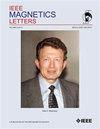反铁磁性化合物磁热效应的平均场模型
IF 1.1
4区 物理与天体物理
Q4 ENGINEERING, ELECTRICAL & ELECTRONIC
引用次数: 1
摘要
反铁磁性化合物在文献中已知具有反磁热效应(MCE)。这种效应的特点是负绝热温度变化$\Delta{T}_S反铁磁性材料在施加磁场时的$。在等温过程中,正熵变化$\Delta{S}_T预计还会有美元。最近,由于自旋翻转和自旋翻转跃迁,反铁磁性化合物的各向异性特性已经被指出,这突出了反铁磁化合物在旋转磁热器件中的适用性。在这项工作中,我们系统地研究了一个平均场模型,该模型以多元结构的方法描述了材料的反铁磁行为。我们的模型包括最近邻和次近邻交换相互作用、塞曼效应和单轴各向异性能量。我们研究了各向异性对自旋翻转和自旋翻转跃迁的影响。我们还演示并验证了$-{\rm{\Delta}}的区域规则{S}_T$对T曲线,可用于饱和磁化强度与磁场相关的化合物。本文章由计算机程序翻译,如有差异,请以英文原文为准。
Mean-Field Modeling of Magnetocaloric Effect of Antiferromagnetic Compounds
Antiferromagnetic compounds are known in the literature to present the inverse magnetocaloric effect (MCE). This effect is characterized by the negative adiabatic temperature change
$\Delta {T}_S$ $\Delta {S}_T$ $ - {\rm{\Delta }}{S}_T$ T
curves that can be used on compounds where the saturation magnetization is magnetic field dependent.
求助全文
通过发布文献求助,成功后即可免费获取论文全文。
去求助
来源期刊

IEEE Magnetics Letters
PHYSICS, APPLIED-
CiteScore
2.40
自引率
0.00%
发文量
37
期刊介绍:
IEEE Magnetics Letters is a peer-reviewed, archival journal covering the physics and engineering of magnetism, magnetic materials, applied magnetics, design and application of magnetic devices, bio-magnetics, magneto-electronics, and spin electronics. IEEE Magnetics Letters publishes short, scholarly articles of substantial current interest.
IEEE Magnetics Letters is a hybrid Open Access (OA) journal. For a fee, authors have the option making their articles freely available to all, including non-subscribers. OA articles are identified as Open Access.
 求助内容:
求助内容: 应助结果提醒方式:
应助结果提醒方式:


